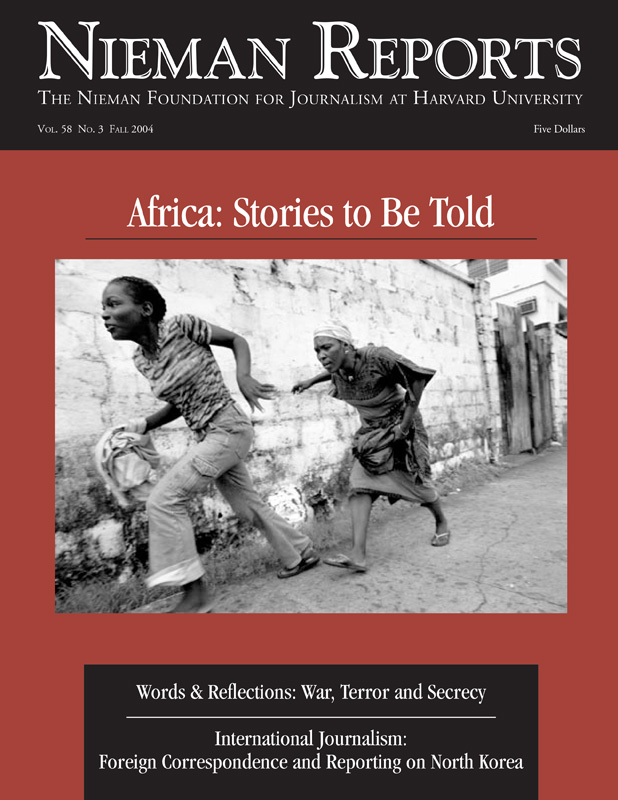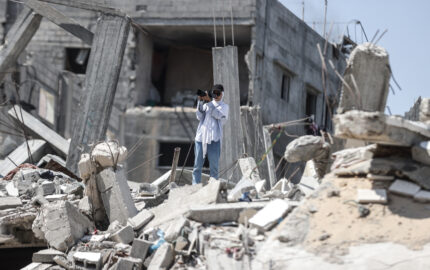On the eve of the World Press Freedom Day, May 3, 2004, the United Nations Department of Public Information launched “Ten Stories the World Should Hear More About.” Half of these under-reported stories deal with humanitarian emergencies and conflict or post-conflict situations in Africa. A sixth story relates to the U.N.’s economic burdens as it is called upon to set up peacekeeping forces in several African nations, including Liberia and Ivory Coast. The stories summarized below can be found at http://www.un.events/tenstories/, along with contact information for journalists.
Uganda: Child Soldiers at Center of Mounting Humanitarian Crisis
Uganda’s capital city, Kampala, has seen a revitalization in recent years, but a long-standing rebellion of the Lord’s Resistance Army (LRA) has forced 1.6 million Ugandans to flee their villages. The most disturbing part of the crisis—which shows no sign of resolution—is that almost 90 percent of the LRA is comprised of children as young as eight years old. Against their will, an estimated 30,000 children are forced to commit acts of violence—as thousands of children are abducted by the LRA. To escape capture, some children and parents leave their homes at night, seeking safety in neighboring towns until dawn. Humanitarians have received less than 10 percent of the $130 million requested to help with malnutrition and health facilities, severely affected by LRA attacks.
Central African Republic: A Silent Crisis Crying Out for Help
Despite the rich resources and consequent economic potential of the Central African Republic (CAR), the region’s continuing struggle with disease and military coups has created a situation the United Nations calls “fragile and volatile.” While elections are envisioned in the wake of General Bozize’s 2003 seizure of the presidency, CAR still ranks 154th among the world’s 174 poorest countries, and an estimated 15 percent of the population is infected with HIV/AIDS. Armed groups linked to General Bozize continue to commit human rights violations outside the capital of Bangui. Concern is growing that neighboring countries might soon be affected by CAR’s volatile situation, such as Democratic Republic of the Congo, Sudan and Chad.
AIDS Orphans in Sub-Saharan Africa: A Looming Threat to Future Generations
The unchecked spread of HIV/AIDS in sub-Saharan Africa is creating a generation of orphans. According to the United Nations, “During the last decade the proportion of children orphaned as a result of AIDS rose from 3.5 percent to 32 percent,” a figure expected to climb even higher without “urgent national strategies” addressing government, community and family capacities in sub-Saharan countries. In addition to affecting the orphan generation with poor health, psychological issues, and dramatically high mortality rates, the AIDS crisis is predicted to threaten future generations’ growth structures and economies. “… this problem should remain at the center of attention of all concerned—governments, the public, and the media—to stem the spread of this scourge,” the U.N. contends.
Bakassi Peninsula: Recourse to the Law to Prevent Conflict
The question of sovereignty over the Bakassi peninsula, a 1,600 kilometer strip of land rich in natural resources, has been a source of contention between bordering countries Cameroon and Nigeria since 1913. In 1994, Cameroon approached the International Court of Justice (ICJ) for a ruling, and after eight years of peaceful arbitration, the ICJ ruled that sovereignty lies with Cameroon. President Paul Biya of Cameroon and President Olusegun Obasanjo of Nigeria have since requested a Cameroon-Nigeria Mixed Commission that will ensure both parties representation as they consider ways to enforce the ruling. The U.N. cites this as an illustration of “the crucial role of multilateral measures, such as the potential of dialogue and conflict resolution offered by recourse to the the ICJ” and calls the Mixed Commission “an exemplary model for preventative diplomacy and a precious tool for moving from a culture of reaction to a culture of peace.”
Women as Peacemakers: From Victims to Rebuilders of Society
Ten years after the abuse and violence of the Rwandan genocide, women in Rwanda and other parts of sub-Saharan Africa are rebuilding their countries, establishing democratic governments, and empowering women. These women “through their often unseen and unsung work are bringing peace to many troubled countries,” the U.N. asserts. In the September 2003 parliamentary elections, Rwandan women won 49 percent of the seats in legislature, far surpassing the May 2003 constitutional ruling allotting 30 percent of decision-making positions to women. In other areas of sub-Saharan Africa, governments have begun using quotas, and this has led to an increase in the number of women serving in the parliaments. In Liberia, the women who created the Mano River Women’s Peace Network were given a voice in Liberian peace talks and became a signatory of the Liberian peace agreement.
Uganda: Child Soldiers at Center of Mounting Humanitarian Crisis
Uganda’s capital city, Kampala, has seen a revitalization in recent years, but a long-standing rebellion of the Lord’s Resistance Army (LRA) has forced 1.6 million Ugandans to flee their villages. The most disturbing part of the crisis—which shows no sign of resolution—is that almost 90 percent of the LRA is comprised of children as young as eight years old. Against their will, an estimated 30,000 children are forced to commit acts of violence—as thousands of children are abducted by the LRA. To escape capture, some children and parents leave their homes at night, seeking safety in neighboring towns until dawn. Humanitarians have received less than 10 percent of the $130 million requested to help with malnutrition and health facilities, severely affected by LRA attacks.
Central African Republic: A Silent Crisis Crying Out for Help
Despite the rich resources and consequent economic potential of the Central African Republic (CAR), the region’s continuing struggle with disease and military coups has created a situation the United Nations calls “fragile and volatile.” While elections are envisioned in the wake of General Bozize’s 2003 seizure of the presidency, CAR still ranks 154th among the world’s 174 poorest countries, and an estimated 15 percent of the population is infected with HIV/AIDS. Armed groups linked to General Bozize continue to commit human rights violations outside the capital of Bangui. Concern is growing that neighboring countries might soon be affected by CAR’s volatile situation, such as Democratic Republic of the Congo, Sudan and Chad.
AIDS Orphans in Sub-Saharan Africa: A Looming Threat to Future Generations
The unchecked spread of HIV/AIDS in sub-Saharan Africa is creating a generation of orphans. According to the United Nations, “During the last decade the proportion of children orphaned as a result of AIDS rose from 3.5 percent to 32 percent,” a figure expected to climb even higher without “urgent national strategies” addressing government, community and family capacities in sub-Saharan countries. In addition to affecting the orphan generation with poor health, psychological issues, and dramatically high mortality rates, the AIDS crisis is predicted to threaten future generations’ growth structures and economies. “… this problem should remain at the center of attention of all concerned—governments, the public, and the media—to stem the spread of this scourge,” the U.N. contends.
Bakassi Peninsula: Recourse to the Law to Prevent Conflict
The question of sovereignty over the Bakassi peninsula, a 1,600 kilometer strip of land rich in natural resources, has been a source of contention between bordering countries Cameroon and Nigeria since 1913. In 1994, Cameroon approached the International Court of Justice (ICJ) for a ruling, and after eight years of peaceful arbitration, the ICJ ruled that sovereignty lies with Cameroon. President Paul Biya of Cameroon and President Olusegun Obasanjo of Nigeria have since requested a Cameroon-Nigeria Mixed Commission that will ensure both parties representation as they consider ways to enforce the ruling. The U.N. cites this as an illustration of “the crucial role of multilateral measures, such as the potential of dialogue and conflict resolution offered by recourse to the the ICJ” and calls the Mixed Commission “an exemplary model for preventative diplomacy and a precious tool for moving from a culture of reaction to a culture of peace.”
Women as Peacemakers: From Victims to Rebuilders of Society
Ten years after the abuse and violence of the Rwandan genocide, women in Rwanda and other parts of sub-Saharan Africa are rebuilding their countries, establishing democratic governments, and empowering women. These women “through their often unseen and unsung work are bringing peace to many troubled countries,” the U.N. asserts. In the September 2003 parliamentary elections, Rwandan women won 49 percent of the seats in legislature, far surpassing the May 2003 constitutional ruling allotting 30 percent of decision-making positions to women. In other areas of sub-Saharan Africa, governments have begun using quotas, and this has led to an increase in the number of women serving in the parliaments. In Liberia, the women who created the Mano River Women’s Peace Network were given a voice in Liberian peace talks and became a signatory of the Liberian peace agreement.



